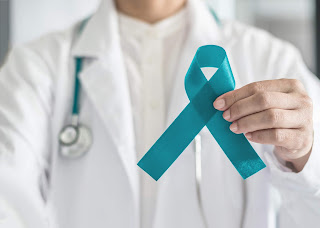September is National Ovarian Cancer Awareness Month

Though considered rare among all cancers, ovarian cancer is the deadliest of gynecological malignancies—due, in large part, to its notorious silence. During the month of September, we join the NationalOvarian Cancer Coalition and others nationwide in promoting awareness around this potentially devastating disease.
Because
early signs of ovarian cancer, if present at all, often go unnoticed or are
attributed to less serious conditions, diagnosis typically occurs at advanced,
less treatable stages. For this reason, staying attuned to your body and
recognizing when something isn’t right is the key to earlier diagnosis and,
ultimately, effective treatment.
Red flags
Most
cases of ovarian cancer are seen in women over age 55, but it can develop at
any age. It sometimes presents with common gastrointestinal issues, such as
indigestion, bloating, pain, bowel changes or feeling full quickly.
Other possible
symptoms include urinary urgency (feeling of having to go) or frequency, back
pain, pain during sex, period changes and extreme fatigue. Although ovarian
cancer is an unlikely cause, never dismiss these problems, especially if they
are new or unusual for you, get worse or don’t go away. Make an appointment with your ob/gyn as soon as possible.
Just
as important as paying attention to your body’s signals is having regular
gynecological exams, or “well woman” checkups. These allow your provider to get
an overall picture of your health, including new concerns or recent changes.
Unlike
some other abdominal or pelvic cancers, ovarian masses themselves are difficult
or impossible to feel on regular examination until they are quite large. This
makes good communication critical for determining whether certain tests, such
as transvaginal ultrasound, may be warranted.
If
you’re due for a regular checkup or have any concerns about your gynecological health,
call us for an appointment today. You know your body
best. Be sure to listen to it closely—this month and always.












